#data base server
Explore tagged Tumblr posts
Text
I think I have to get rid of a player's base on my server. It's. It's crashing the whole server whenever it loads
#yol tor shul#mnemonic planisphere server#i deleted the chunks of it in amulet and then the area loads fine#idk what's IN there that is making the server die#I'm doing heretical things to my player data to move me to my own base on the server
1 note
·
View note
Text
I'm having a lot of fun with starlight, much more fun than I thought I would
#I only downloaded it cause of the music lmao#only downside is it's still a relatively new game so there's no card data bases#I wanna know what to save up for#esp since they wanna catch up to the jp server asap
1 note
·
View note
Text
Subject: Server Launch Schedule
Date: Mar-03
Our engineers are currently conducting their final tests on our proprietary file transferring technology. I don't foresee any delays.
Esmond Baza, M.S.
Corporate Technician
Future Control Industries
#server launch schedule#[email protected]#[email protected]#mar 03#data base#primary docking port#seth crown#esmond baza
0 notes
Photo

Turns out that cloud migration services delivers on its promises as 80 percent of companies that embraced the cloud saw a drastic fall in their expenses and increased improvements in their IT department.
#data#data migration#cloud servers#cloud based services#database migration service#data center migration
0 notes
Text
I'm seeing some frustration over fandom creatives expressing anger or distress over people feeding their work into ChatGPT. I'm not responding to OP directly because I don't want to derail their post (their intent was to provide perspective on how these models actually work, and reduce undue panic, which is all coming from a good place!), but reassurances that the addition of our work will have a negligible impact on the model (which is true at this point) does kind of miss the point? Speaking for myself, my distress is less about the practical ramifications of feeding my fic into ChatGPT, and more about the principle of someone taking my work and deliberately adding it to the dataset.
Like, I fully realize that my work is a drop in the bucket of ChatGPT's several-billion-token training set! It will not make a demonstrable practical difference in the output of the model! That doesn't change the fact that I do not want my work to be part of the set of data that the ChatGPT devs use for training.
According to their FAQ, ChatGPT can and will use user input to train itself. The terms and conditions explicitly state that they save your chats to help train and improve their models. (You can opt-out, but sharing is the default.) So if you're feeding a fic into ChatGPT, unless you've explicitly opted out, you are handing it to the ChatGPT team and giving them permission to use it for training, whether or not that was your intent.
Now, will one fic make a demonstrable difference in the output of the model? No! But as the person who spent a year and a handful of months laboring over my fic, it makes a difference to me whether my fic, specifically, is being used in the dataset. If authors are allowed to have a problem with the ChatGPT devs for scraping millions of fics without permission, they're also allowed to have a problem with folks handing their individual fics over via the chat interface.
I do want to add that if you've done this to a fic, please don't take this as me being upset with you personally! Folks are still learning new information and puzzling out what "good" vs. "bad" use is, from an ethical standpoint. (Heck, my own perspective on this is deeply based on my own subjective feelings!) And we certainly shouldn't act like one person feeding a fic into ChatGPT has the same practical negative impact, on a broad societal scale, as a team using a web crawler to scrape five billion pieces of artwork for Stable Diffusion.
The point is that fundamentally, an ethical dataset should be obtained with the consent of those providing the data. Just because it's normalized for our data to be scraped without consent doesn't make it ethical, and this is why ChatGPT gives users the option to not share data— there is actually a standardized way (robots.txt) for website servers to set policies for how bots/crawlers can interact with them, for exactly this reason— and I think fandom artists and authors are well within their rights to express a desire for opting out to be the socially-respected default within the fandom community.
#maybe this is an ice cold take but i've been meaning to go off about datasets for a while so here we are i guess#i can respect what op's frustrations were and what they were trying to get at! but also i do not want my fic in chatgpt's dataset#regardless of whether it will make a practical difference#and again i don't think the people doing this are necessarily bad actors or having a huge negative social impact#chatgpt#chat gpt#ai#fandom#negative#(possibly! i'm trying not to be!! especially because this is very feelings-based and there are many things i am not considering)#the model may not demonstrably change because of your fic. but it does have your fic now and that does matter maybe idk
3K notes
·
View notes
Text

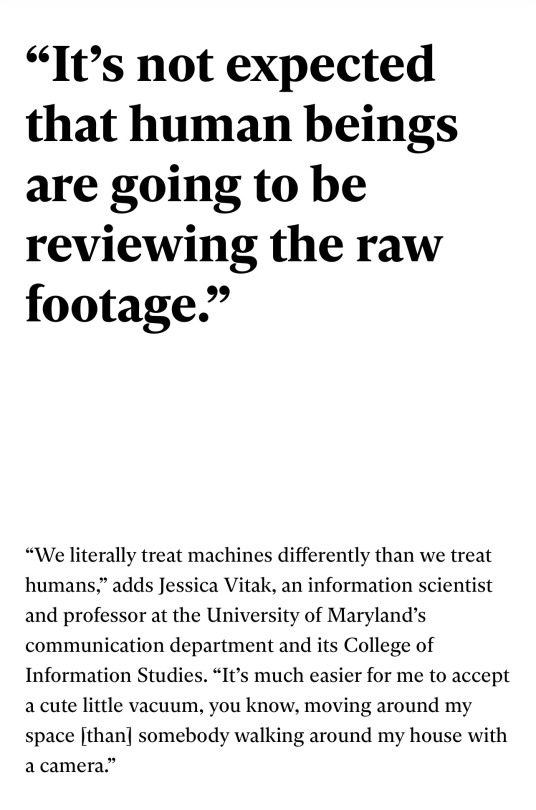


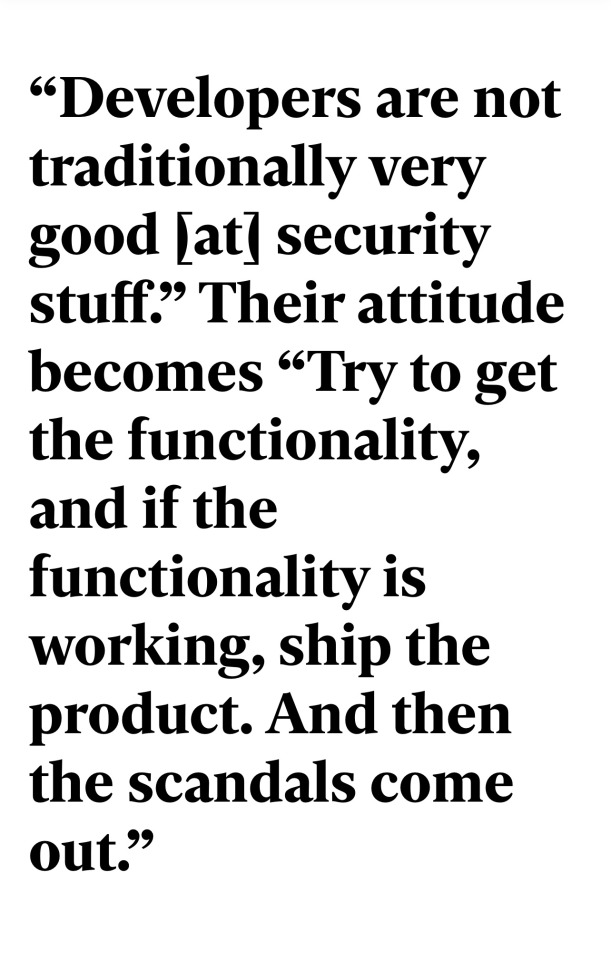
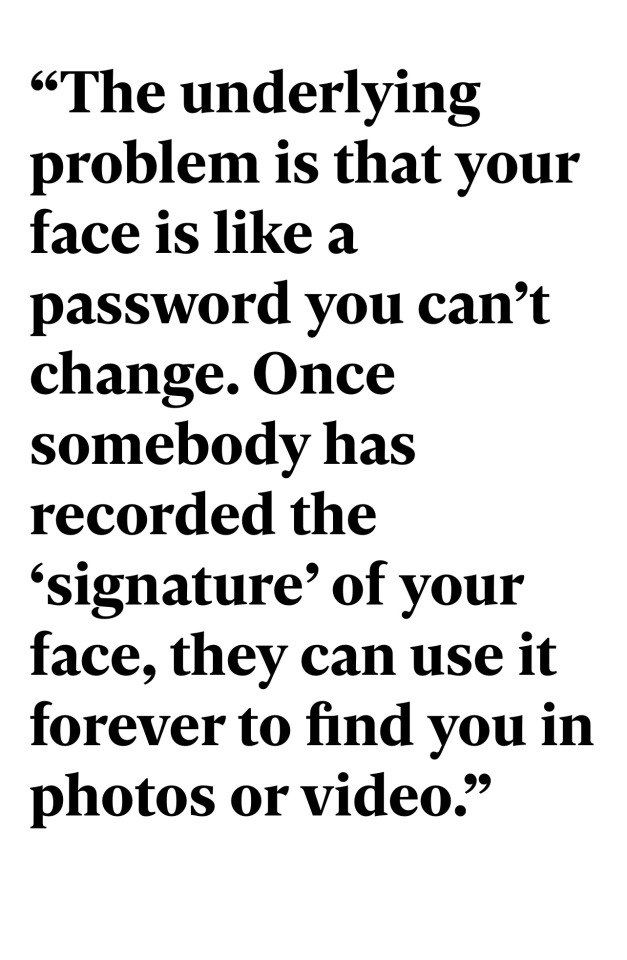
IN THE FALL OF 2020, GIG WORKERS IN VENEZUELA POSTED A SERIES OF images to online forums where they gathered to talk shop. The photos were mundane, if sometimes intimate, household scenes captured from low angles—including some you really wouldn’t want shared on the Internet.
In one particularly revealing shot, a young woman in a lavender T-shirt sits on the toilet, her shorts pulled down to mid-thigh.
The images were not taken by a person, but by development versions of iRobot’s Roomba J7 series robot vacuum. They were then sent to Scale AI, a startup that contracts workers around the world to label audio, photo, and video data used to train artificial intelligence.
They were the sorts of scenes that internet-connected devices regularly capture and send back to the cloud—though usually with stricter storage and access controls. Yet earlier this year, MIT Technology Review obtained 15 screenshots of these private photos, which had been posted to closed social media groups.
The photos vary in type and in sensitivity. The most intimate image we saw was the series of video stills featuring the young woman on the toilet, her face blocked in the lead image but unobscured in the grainy scroll of shots below. In another image, a boy who appears to be eight or nine years old, and whose face is clearly visible, is sprawled on his stomach across a hallway floor. A triangular flop of hair spills across his forehead as he stares, with apparent amusement, at the object recording him from just below eye level.

iRobot—the world’s largest vendor of robotic vacuums, which Amazon recently acquired for $1.7 billion in a pending deal—confirmed that these images were captured by its Roombas in 2020.
Ultimately, though, this set of images represents something bigger than any one individual company’s actions. They speak to the widespread, and growing, practice of sharing potentially sensitive data to train algorithms, as well as the surprising, globe-spanning journey that a single image can take—in this case, from homes in North America, Europe, and Asia to the servers of Massachusetts-based iRobot, from there to San Francisco–based Scale AI, and finally to Scale’s contracted data workers around the world (including, in this instance, Venezuelan gig workers who posted the images to private groups on Facebook, Discord, and elsewhere).
Together, the images reveal a whole data supply chain—and new points where personal information could leak out—that few consumers are even aware of.
(continue reading)
#politics#james baussmann#scale ai#irobot#amazon#roomba#privacy rights#colin angle#privacy#data mining#surveillance state#mass surveillance#surveillance industry#1st amendment#first amendment#1st amendment rights#first amendment rights#ai#artificial intelligence#iot#internet of things
5K notes
·
View notes
Text
Social Quitting

In “Social Quitting,” my latest Locus Magazine column, I advance a theory to explain the precipitous vibe shift in how many of us view the once-dominant social media platforms, Facebook and Twitter, and how it is that we have so quickly gone asking what we can do to get these services out of our lives to where we should go now that we’re all ready to leave them:
https://locusmag.com/2023/01/commentary-cory-doctorow-social-quitting/
The core of the argument revolves around surpluses — that is, the value that exists in the service. For a user, surpluses are things like “being able to converse with your friends” and “being able to plan activities with your friends.” For advertisers, surpluses are things like “being able to target ads based on the extraction and processing of private user data” and “being able to force users to look at ads before they can talk to one another.”
For the platforms, surpluses are things like, “Being able to force advertisers and business customers to monetize their offerings through the platform, blocking rivals like Onlyfans, Patreon, Netflix, Amazon, etc” and things like “Being able to charge more for ads” and “being able to clone your business customers’ products and then switch your users to the in-house version.”
Platforms control most of the surplus-allocating options. They can tune your feed so that it mostly consists of media and text from people you explicitly chose to follow, or so that it consists of ads, sponsored posts, or posts they think will “boost engagement” by sinking you into a dismal clickhole. They can made ads skippable or unskippable. They can block posts with links to rival sites to force their business customers to transact within their platform, so they can skim fat commissions every time money changes hands and so that they can glean market intelligence about which of their business customers’ products they should clone and displace.
But platforms can’t just allocate surpluses will-ye or nill-ye. No one would join a brand-new platform whose sales-pitch was, “No matter who you follow, we’ll show you other stuff; there will be lots of ads that you can’t skip; we will spy on you a lot.” Likewise, no one would sign up to advertise or sell services on a platform whose pitch was “Our ads are really expensive. Any business you transact has to go through us, and we’ll take all your profits in junk fees. This also lets us clone you and put you out of business.”
Instead, platforms have to carefully shift their surpluses around: first they have to lure in users, who will attract business customers, who will generate the fat cash surpluses that can be creamed off for the platforms’ investors. All of this has to be orchestrated to lock in each group, so that they won’t go elsewhere when the service is enshittified as it processes through its life-cycle.
This is where network effects and switching costs come into play. A service has “network effects” if it gets more valuable as users join it. You joined Twitter to talk to the people who were already using it, and then other people joined so they could talk to you.
“Switching costs” are what you have to give up when you leave a service: if a service is siloed — if it blocks interoperability with rivals — then quitting that service means giving up access to the people whom you left behind. This is the single most important difference between ActivityPub-based Fediverse services like Mastodon and the silos like Twitter and Facebook — you can quit a Fediverse server and set up somewhere else, and still maintain your follows and followers:
https://pluralistic.net/2022/12/23/semipermeable-membranes/#free-as-in-puppies
In the absence of interoperability, network effects impose their own switching cost: the “collective action problem” of deciding when to leave and where to go. If you depend on the people you follow and who follow you — for emotional support, for your livelihood, for community — then the extreme difficulty of convincing everyone to leave at the same time and go somewhere else means that you can be enticed into staying on a service that you no longer enjoy. The platforms can shift the surpluses away from you, provided that doing so makes you less miserable than abandoning your friends or fans or customers would. This is the Fiddler On the Roof problem: everyone stays put in the shtetl even though the cossacks ride through on the reg and beat the shit out of them, because they can’t all agree on where to go if they leave:
https://doctorow.medium.com/how-to-leave-dying-social-media-platforms-9fc550fe5abf
So the first stage of the platform lifecycle is luring in users by allocating lots of surplus to them — making the service fun and great and satisfying to use. Few or no ads, little or no overt data-collection, feeds that emphasize the people you want to hear from, not the people willing to pay to reach you.
This continues until the service attains a critical mass: once it becomes impossible to, say, enroll your kid in a little-league baseball team without having a Facebook account, then Facebook can start shifting its surpluses to advertisers and other business-users of the platform, who will pay Facebook to interpose themselves in your use of the platform. You’ll hate it, but you won’t leave. Junior loves little-league.
Facebook can enshittify its user experience because the users are now locked in, holding each other hostage. If Facebook can use the courts and technological countermeasures to block interoperable services, it can increase its users’ switching costs, producing more opportunities for lucrative enshittification without the risk of losing the users that make Facebook valuable to advertisers. That’s why Facebook pioneered so many legal tactics for criminalizing interoperability:
https://www.eff.org/cases/facebook-v-power-ventures
This is the second phase of the toxic platform life-cycle: luring in business customers by shifting surpluses from users to advertisers, sellers, etc. This is the moment when the platforms offer cheap and easy monetization, low transaction fees, few barriers to off-platform monetization, etc. This is when, for example, a news organization can tease an article on its website with an off-platform link, luring users to click through and see the ads it controls.
Because Facebook has locked in its users through mutual hostage-taking, it can pollute their feeds with lots of these posts to news organizations’ sites, bumping down the messages from its users’ friends, and that means that Facebook can selectively tune how much traffic it gives to different kinds of business customers. If Facebook wants to lure in sports sites, it can cram those sites’ posts into millions of users’ feeds and send floods of traffic to sports outlets.
Outlets that don’t participate in Facebook lose out, and so they join Facebook, start shoveling their content into it, hiring SEO Kremlinologists to help them figure out how to please The Algorithm, in hopes of gaining a permanent, durable source of readers (and thus revenue) for their site.
But ironically, once a critical mass of sports sites are on Facebook, Facebook no longer needs to prioritize sports sites in its users’ feeds. Now that the sports sites all believe that a Facebook presence is a competitive necessity, they will hold each other hostage there, egging each other on to put more things on Facebook, even as the traffic dwindles.
Once sports sites have taken each other hostage, Facebook can claw back the surplus it allocated to them and use it to rope in another sector — health sites, casual games, employment seekers, financial advisors, etc etc. Each group is ensnared by a similar dynamic to the one that locks in the users.
But there is a difference between users’ surpluses and business’s surpluses. A user’s surplus is attention, and there is no such thing as an “attention economy.” You can’t use attention to pay for data-centers, or executive bonuses, or to lobby Congress. Attention is not a currency in the same way that cryptos are not currency — it is not a store of value, nor a unit of exchange, nor or a unit of account.
Turning attention into money requires the same tactics as turning crypto into money — you have to lure in people who have real, actual money and convince them to swap it for attention. With crypto, this involved paying Larry David, Matt Damon, Spike Lee and LeBron James to lie about crypto’s future in order to rope in suckers who would swap their perfectly cromulent “fiat” money for unspendable crypto tokens.
With platforms, you need to bring in business customers who get paid in actual cash and convince them to give you that cash in exchange for ethereal, fast-evaporating, inconstant, unmeasurable “attention.” This works like any Ponzi scheme (that is, it works like cryptos): you can use your shareholders’ cash to pay short-term returns to business customers, losing a little money as a convincer that brings in more trade.
That’s what Facebook did when it sent enormous amounts of traffic to a select few news-sites that fell for the pivot to video fraud, in order to convince their competitors to borrow billions of dollars to finance Facebook’s bid to compete with Youtube:
https://doctorow.medium.com/metaverse-means-pivot-to-video-adbe09319038
This convincer strategy is found in every con. If you go to the county fair, you’ll see some poor bastard walking around all day with a giant teddy bear that he “won” by throwing three balls into a peach-basket. The carny who operated that midway game let him win the teddy precisely so that he would walk around all day, advertising the game, which is rigged so that no one else wins the giant teddy-bear:
https://boingboing.net/2006/08/27/rigged-carny-game.html
Social media platforms can allocate giant teddy-bears to business-customers, and it can also withdraw them at will. Careful allocations mean that the platform can rope in a critical mass of business customers and then begin the final phase of its life-cycle: allocating surpluses to its shareholders.
We know what this looks like.
Rigged ad-markets:
https://en.wikipedia.org/wiki/Jedi_Blue
Understaffed content moderation departments:
https://www.dw.com/en/twitters-sacking-of-content-moderators-will-backfire-experts-warn/a-63778330
Knock-off products:
https://techcrunch.com/2021/12/08/twitter-is-the-latest-platform-to-test-a-tiktok-copycat-feature/
Nuking “trust and safety”:
https://www.reuters.com/technology/twitter-dissolves-trust-safety-council-2022-12-13/
Hiding posts that have links to rival services:
https://www.makeuseof.com/content-types-facebook-hides-why/
Or blocking posts that link to rival services:
https://pluralistic.net/2022/12/19/better-failure/#let-my-tweeters-go
Or worse, terminating accounts for linking to rival services:
https://blog.joinmastodon.org/2022/12/twitter-suspends-mastodon-account-prevents-sharing-links/
That is, once a platform has its users locked in, and has its business customers locked in, it can enshittify its service to the point of near uselessness without losing either, allocating all the useful surplus in the business to its shareholders.
But this strategy has a problem: users and business customers don’t like to be locked in! They will constantly try to find ways to de-enshittify your service and/or leave for greener pastures. And being at war with your users and business customers means that your reputation continuously declines, because every time a user or business customer figures out a way to claw back some surplus, you have to visibly, obviously enshittify your service wrestle it back.
Every time a service makes headlines for blocking an ad-blocker, or increasing its transaction fees, or screwing over its users or business customers in some other way, it makes the case that the price you pay for using the service is not worth the value it delivers.
In other words, the platforms try to establish an equilibrium where they only leave business customers and users with the absolute bare minimum needed to keep them on the service, and extract the rest for their shareholders. But this is a very brittle equilibrium, because the prices that platforms impose on their users and business customers can change very quickly, even if the platforms don’t do anything differently.
Users and business customers can revalue the privacy costs, or the risks of staying on the platform based on exogenous factors. Privacy scandals and other ruptures can make the cost you’ve been paying for years seem higher than you realized and no longer worth it.
This problem isn’t unique to social media platforms, either. It’s endemic to end-stage capitalism, where companies can go on for years paying their workers just barely enough to survive (or even less, expecting them to get public assistance and/or a side-hustle), and those workers can tolerate it, and tolerate it, and tolerate it — until one day, they stop.
The Great Resignation, Quiet Quitting, the mass desertions from the gig economy — they all prove the Stein’s Law: “Anything that can’t go on forever will eventually stop.”
Same for long, brittle supply-chains, where all the surplus has been squeezed out: concentrating all the microchip production in China and Taiwan, all the medical saline in Puerto Rico, all the shipping into three cartels… This strategy works well, and can be perfectly tuned with mathematical models that cut right to the joint, and they work and they work.
Until they stop. Until covid. Or war. Or wildfires. Or floods. Or interest rate hikes. Or revolution. All this stuff works great until you wake up and discover that the delicate balance between paying for guard labor and paying for a fair society has tilted, and now there’s a mob building a guillotine outside the gates of your luxury compound.
This is the force underpinning collapse: “slow at first, then all at once.” A steady erosion of the failsafes, flensing all the slack out of the system, extracting all the surpluses until there’s nothing left in the reservoir, no reason to stay.
It’s what caused the near-collapse of Barnes and Noble, and while there are plenty of ways to describe James Daunt’s successful turnaround, the most general characterization is, “He has reallocated the company’s surpluses to workers, readers, writers and publishers”:
https://tedgioia.substack.com/p/what-can-we-learn-from-barnes-and
A system can never truly stabilize. This is why utopias are nonsense: even if you design the most perfect society in which everything works brilliantly, it will still have to cope with war and meteors and pandemics and other factors beyond your control. A system can’t just work well, it has to fail well.
This is why I object so strenuously to people who characterize my 2017 novel Walkaway as a “dystopian novel.” Yes, the protagonists are eking out survival amidst a climate emergency and a failing state, but they aren’t giving up, they’re building something new:
https://locusmag.com/2017/06/bruce-sterling-reviews-cory-doctorow/
“Dystopia” isn’t when things go wrong. Assuming nothing will go wrong doesn’t make you an optimist, it makes you an asshole. A dangerous asshole. Assuming nothing will go wrong is why they didn’t put enough lifeboats on the Titanic. Dystopia isn’t where things go wrong. Dystopia is when things go wrong, and nothing can be done about it.
Anything that can’t go on forever will eventually stop. The social media barons who reeled users and business customers into a mutual hostage-taking were confident that their self-licking ice-cream cone — in which we all continued to energetically produce surpluses for them to harvest, because we couldn’t afford to leave — would last forever.
They were wrong. The important thing about the Fediverse isn’t that it’s noncommercial or decentralized — it’s that its design impedes surplus harvesting. The Fediverse is designed to keep switching costs as low as possible, by enshrining the Right Of Exit into the technical architecture of the system. The ability to leave a service without paying a price is the best defense we have against the scourge of enshittification.
(Thanks to Tim Harford for inspiring this column via an offhand remark in his kitchen a couple months ago!)
[Image ID: The Phillip Medhurst Picture Torah 397. The Israelites collect manna. Exodus cap 16 v 14. Luyken and son.]
#pluralistic#social media#post-twitter#post-facebook#switching costs#network effects#web theory#locus magazine#exodus#decentralization
3K notes
·
View notes
Text
Data Lake Market Size Worth $31.5 Billion By 2027
The global data lake market size is expected to reach USD 31.5 billion by 2027, according to a new report by Grand View Research, Inc. The market is anticipated to expand at a CAGR of 20.6% from 2020 to 2027. Data lake is a cost-effective alternative for several companies for their information collection and storage applications as compared to data warehousing. Also, data warehousing requires additional computing of the information in the initial stages, unlike in the data lake. Further, the maintenance cost of the technology is lower than data warehousing, owing to the cost of building a database, and the number of operations in the warehousing. Likewise, the technology enhances the analytical capabilities of the organizations.
Increasing need to extract deeper insights from huge volumes of information and easy access of information to the organization from legacy systems and departmental silos is expected to boost market growth. Several organizations are using the storage technique to gain a competitive advantage in the market. Also, companies that have not implemented data warehousing are moving towards this advanced method to storage information. The rising shift in the direction of developing cloud-based platforms to mitigate and manage the information is anticipated to offer increased adoption of technology over the forecast period.
With the rise in big data applications, several prominent companies are focusing on developing services that support both structured and unstructured information. For instance, in February 2020, Databricks launched Data Ingestion Network and Data Ingestion services. These services and networks would simplify the combination of data lakes and data warehouses into a single platform. The company has named the combination as ‘lakehouse'.
For More Details or Sample Copy please visit link @: https://www.grandviewresearch.com/industry-analysis/data-lake-market
The on-premise deployment segment is anticipated to account for highest market share over the forecast period. This is attributed to high demand for on-premise servers by the companies to store information. These servers help companies to perform their operations effectively. The IT vertical segment is anticipated to account for highest CAGR over the forecast period. This is attributed to increasing adoption of advanced techniques to store information by the IT companies to achieve a balance between operational costs and quality of information stored.
In Asia Pacific, the market is anticipated to witness a highest CAGR over the forecast period. This is attributed to growth of digitization and increasing investments by key technology companies in India, China, Australia, and Japan. In addition, government regulations and initiatives are also likely to drive the market in the region over the forecast period. In North America, the market is expected to account for highest revenue share over the forecast period owing to increasing volumes of information across industries in the region.
0 notes
Text
Blockchain is actually a fairly simple technology - or, at least, not any more complicated than anything else about modern computers - but it’s become mystified, because its biggest advocates, the people who present it to the world, aren’t techies.
I’ll have to explain the basics of blockchain before I go on, but this might serve as a good demonstration for our purposes. At its most basic, the ‘blockchain’ is a list. Like a ledger, it’s a big list of things, things like transactions. Everyone has a copy of the list, and they all agree about what’s written on it. When people want to change it, like updating it with new transactions, they have to solve a massive calculation, which takes a lot of processing power. This stops someone from just griefing it, since you have to invest a lot of computing power and electricity. If you lie, and write that someone sent you all their money, everyone else still has their copy of the list and can just ignore you. An ‘NFT’ is just a way of writing something to the list that *isn’t* a transaction - it could be a poem, a http link, or the code of a small file. This is the basis of ‘web3′.
Web3 is the concept of an internet running off of blockchain, off of NFTs. All data would be stored in that list, copied and run by any computer in the network, not just a secret, central server. It’s interesting in theory - but remember that every single update to that list costs an exponentially-increasing amount of processing power, and electricity - costs money. Every post would have a cost, every deletion. It wouldn’t just be a fixed cost either, it’s all crypto: it would vary, be speculated on by investors. Given how much our lives have already moved online, it would be the financialisation of daily life. Every text to a friend would be a microscopic trade of stocks. Your medical records would have a market price, a stock ticker. This is compounded with the fact that only the rich could afford the processing power to solve the calculations - or the storage space to even host the list, terabytes large.
In Postcapitalism, Paul Mason writes that capitalism is pushed to its limits by a means of production - infotech - that fundamentally exceeds capitalist relations of production. With digital information, by virtue of Ctrl+C and Ctrl+V (or, these days, Right Click > Save), the labour cost of a given PDF or MP3 is virtually zero. Every printed book takes labour and a factory to make, but every copied PDF is functionally free. To keep the value of information-goods, ‘intangible assets’, from falling to zero, a prospective “infocapitalism” would have to do more than just enforce strict anti-piracy and DRM, it would have to “take this to its extremes, creating new forms of person-to-person micro-services, paid for using micro-payments, and mainly in the private sector.” Every action would need to be a transaction, “it would have to maximize the capture of externalities by corporations. Every interaction – between producer and consumer, consumer and consumer, friend and friend – would need to be mined for value.”
Web3, the concept of an internet based on blockchain, and a life based on the internet, is the attempt for ‘infocapitalism’. It’s capitalism’s last-ditch effort to tame a technology that’s grown bigger than it. This is why it’s biggest proponents aren’t techies - they’re finance people. They don’t know how a computer works, but they do know that extending finance to the whole internet, turning your life into a stock to be speculated on, would make a lot of money.
#on that note mason is a moron trotskyist social-democrat#and i only keep his book around because I couldn't bear see it on shelves where it could harm poor innocent university students#ghfghfhjg#blockchain#nft#deciding to take this out of drafts even if its not that good#crypto
7K notes
·
View notes
Text

Cyber security System Integrator and Consulting Company in Qatar
Qatar Cyber security system integrator/Consulting company focused in creating value by solving emerging cyber security challenges by innovating methodology covering people process and technology. https://hitsecurity.qa/Vulnerability-Assessment-and-Penetration-Testing.html
#HIT security local Qatar#Cloud Security#cyber security Doha#Best Cyber Security Company#top cyber security company#cyber/cloud services#Data Protection/Privacy#best network Security#server/data base
0 notes
Text
[The Ssum] Harry’s New Chat Content Now Updated
Hello, dear lab participant!

Server maintenance has been completed, and Harry’s Days 101-200 are now accessible. *This update is a data patch only; no app version upgrade has been made.
Want to see more of Harry's candid and cute side (or at least see him try)? Curious about what’s going on around Harry? Determined to know more about the mysteries of 1004?
Log on to The Ssum now to continue the story of you and Harry!
As much as you've been waiting for Harry, he's been waiting for you.
-
[New Update FAQ]
> How do I see new chats?
If you've already completed Harry's Day 100 and haven't moved to another Day, you'll see his new chat as soon as you access the game (or change your Ssumone). Be sure to pay attention to your daily routine when you access the game so you don't miss any chats!
If you haven't yet completed Harry's Day 100, you'll proceed through the chats up to Day 100 as you would on any other day, followed by the Day 101 chat.
> While waiting, I used the Time Machine to replay Harry's old chats, but what happens to the chats I skip when I travel back to Day 101?
All of your conversations with Ssumone are based on your most recent choices, so skipping chats you've already had in the Time Machine will not erase Harry's memories of those chats.
*If you had used the Data Reset feature to go back to Day 1 instead of using the Time Machine, all of your data would have been deleted, so you won't be able to enjoy the stories associated with your previous choices.
> A new chat has started, but I don't get any new messages or even send one!
This is caused by additional resources not downloading properly when you access the game. Instead of using your battery to skip to the next time slot, please restart the app immediately to allow the additional resources to download.
> There seems to be a bug.
We apologize for the inconvenience. For faster support, please contact The Ssum Customer Support with detailed information, including screenshots.
The Ssum Customer Support : https://bit.ly/3cPacLg
-
We hope that the next 100 days with Harry will be fun and happy for you.
We will continue to do our best to make your love research richer and more enjoyable.
Thank you.
-Cheritz-
P.S. Are you new to The Ssum? Conduct in-depth love research in the Forbidden Lab♡
Google Play Store (Android) - link Apple App Store (iOS) - link
152 notes
·
View notes
Text
Ask me Anything -- Tal Smithson
Have you heard of the magical girl genre?
Fuck yes, have you read Sailor Nothing? World-changing. Preneek. Literature. I mean we only have two thirds of it but they were a great two thirds.
If you had awoken in Captain Aspen’s situation, would you have waited as long to wake others up?
I wouldn’t have woken anyone up. I don’t think it would even have occurred to me.
Do you feel more lucky or guilty that you’re the only one to survive your Ring’s ejection? Sorry if this one is too personal.
Why would I feel guilty? I was asleep.
If this is not too rude to ask, could you tell me a little about the Brennan gender identity, and grammar around pronouns?
I don’t know what you’re asking. It’s just a gender. Some people are men and some people are women and some people are brennan. And some people are something else I guess, like Aspen or the Friend.
Did you have any pets, or tend to animals growing up?
I had a pet monitor lizard named Cthulhu.
Have you done any work salvaging preneek data?
Yeah I used to be involved in tracking down and scraping old hard drives and servers for any possible recoverable data. Fillmore! Episode 5, Red Robins Don’t Fly? That was me. I found AND recovered that. You’re welcome.
Would you download a car?
I did once but the machine shop wouldn’t build me anything from unverified files. Also I don’t drive, obviously. Also I have nowhere to put a car.
What is Neocambrian meme culture like?
What’s meme culture?
Do you think the developments with Amy are as wild as I do?
Amy makes no fucking sense, my entire life since waking up on this ship has been a fever dream. In fact I’m not entirely convinced it isn’t a fever dream. Possibly I went to sleep and the neurostimulator started making me dream to preserve my brain on the trip and that’s what’s still happening right now. We’ll all wake up at Hylara super disoriented and filled with years’ worth of false memories.
What do you think should be done with the colonists that are too affected by Amy when the ship reaches Hylara?
It’s hardly up to me, is it? They’re going to die. I’m not a necromancer.
Do you ever worry you are in some sort of preneek science fiction novel, or movie?
What kind of weirdo would write something like this?
You are good at being a cybercriminal, how did you get caught?
The police, as it turns out, are also good at catching a cybercriminal.
If you could bring sometimes from earth with you, what would you pick?
Reget Bryce. Fucking arsehole. I hate that guy. He should have to be on this ship.
Do you want to give some of your dreams to Amy?
No, I’m very glad to have woken up before that could happen. Although maybe if she had a brain that knew literally anything about computers she wouldn’t be such a fucking mess in there.
What you hate the most?
People who think Star Trek and Star Wars were alternate names for the same franchise and totally fuck up our databases through unnecessary combinations. No Spock wasn’t a Force user. That took so many months to fix.
Are you scared of being made into a slave when you land?
I honestly don’t see how things are going to be significantly different to our current situation, except that we will be on the ground and presumably have less gaming time.
Kill someone innocent or be killed? Choose one.
We’ve got like four thousand spare innocent lives on hand, it’s not like it’s a limited resource. I probably will end up fucking up and killing at least one of them anyway. Just based on probability and this fucking nightmare of an AI.
Have you even be out of Texas?
Yeah I went on this submarine trip once to follow an old internet cable we discovered in the hopes that it would lead to some interesting server with some interesting information. It didn’t. It just lead to a small bunker from the time of the collapse, a seal had been breached and the entire thing was flooded. Nothing electronic was recoverable. There were some cool skeletons in there though.
152 notes
·
View notes
Text
Subject: Server Launch Schedule
From: [email protected]
Date: Mar-03
Good, I'll pass the news along to the team.
Begin launch sequence. I want this thing up and running and fully loaded with DataWraiths ASAP. Scheduled transfer onto the Net is still green.
What's the status on the transmission tools?
Esmond Baza, M.S.
Corporate Technician
Future Control Industries
#server launch schedule#[email protected]#[email protected]#mar 03#data base#primary docking port#fcon lab tech#esmond baza#datawraiths
0 notes
Text
THE LINDASIMS2 RESEARCH AND EXPERIMENTATION: PART ONE
No idea how to really make one of these posts. Most Sundays I'd wake up and post my own CC. But not this Sunday.
DISCLAIMER: This is not really a callout post. This is a warning to anyone who intends to download Lindasim's stuff. And a genuine one. I have nothing personal against Linda, this is only what I've found from my own deep dive into Linda's files. I have no proof that what I've found is stuff that Linda herself did, but the stuff does exist. And it's terrible.
WARNING: Some of these images contain racial slurs that may make you uncomfortable.
You can find the nails file I use for my 'research' post here. It's part of the reuploaded March 2021 set and from what I can see that entire set is a giant mess.
Credits go to @dystopianam and aga on @acottonsock's server for providing the links to the files I needed to inspect.
Continue to read if you really want to know what you download when you download Linda's files.
OPENING THE FILE
Obviously, step 1 to any research regarding Sims 2 CC is... opening the file. And at first glance, this may seem completely normal to a CC newbie. It's from 'Base cc #333', 'LS_ACC_TF_AF_nail_M1_4swatches', 'LS_ACC_AF_nail_1v290321_mesh'.

I mean, it looks like any normal Sims 2 file, right? It's a mesh!
Until you open one of DeeDee's own accessory files.

Yeah... notice how there's a TON of stuff that isn't present in the other two?
Now, at first, I gave this the benefit of the doubt. Maybe, I thought, this was just another sign of my lack of knowledge regarding Sims 2 CC. It's been awhile since I've done my own accessories. But let's move on to the next part of my research...
THE 3DID REFERENCING FILES
There are 57 3DID Referencing Files in this nails mesh files. And maybe I'm ignorant, but I'm pretty sure sims don't have 57 fingers.

I didn't have time to actually see where they're pointing to... but... why the heck are they in a mesh file?
THE AGE DATA
This was what originally stood out to me the most. Why the heck is there AGE DATA in a nail accessory?
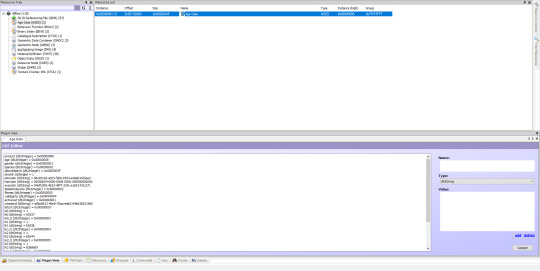
THE BHAVS
In @dystopianam's post, they mentioned the game reading some of Linda's files as mods. Well, I found the reason why.
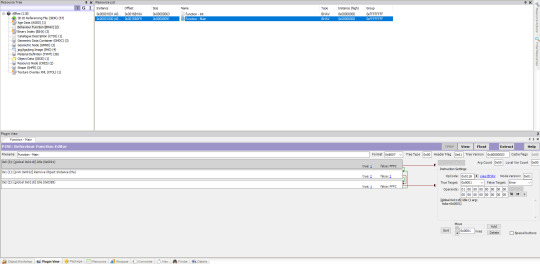
There are... BHAVs? In a mesh file? For those who don't know, BHAVs literally alter the game's code or add new code. From what I can guess these BHAVs probably have something to do with the sim embedded in this file?
THE CATALOG DESCRIPTION
This was the icky part. And why I was hesitant to make this post.

Yep, turns out that whoever made this file is a big fat racist. Also fatphobic. Also probably aware that catalog descriptions shouldn't be in accessory files. Most of the ones I've seen were for objects or... sims. But this one isn't.
THE GMDC AND ASSOCIATED MESH ELEMENTS
Okay, through all of this, I was under the impression that the GMDC, GMND, CRES, and SHPE would be the most boring elements to inspect. I... was wrong.
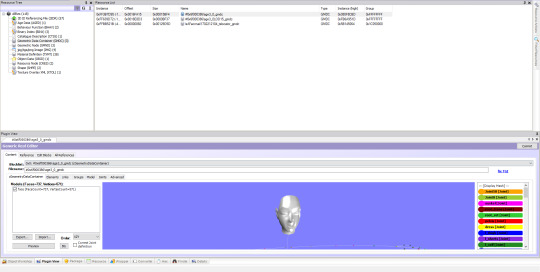
Yep, the sim has a face. No clue what their name is but they are more present in this file than I expected.
THE JPG IMAGES
It's the hero you've all been waiting for... LIGHTNING MCQUEEN himself!!
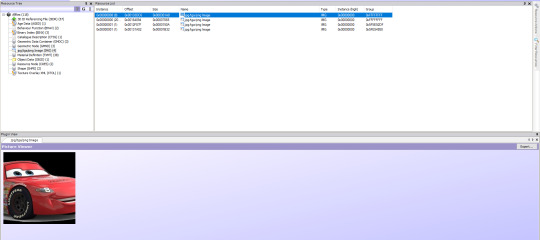
Yep, he's here too! He's real! And he doesn't just accompany hairs, I can tell you that much, because these are nails!
Apparently these were based on Bruno's files? (From MTS), since there's a Bruno JPG slipped in there.
THE MATERIAL DEFINITIONS
There are 38 random material definitions. IDK why they're here. They're just... vibing.

THE OBJD (OBJECT DATA)
I was baffled to see this here. Why's there an object in here, I wondered. Until I realised the game sees this as a person. So, yep. That's the moment I realised there's an actual sim in here.

There's a bit more stuff in this file (most notably the Texture Overlay XML) that wouldn't fit in this post because of the 10 images limit... but fun fact, our secret sim has grey eyes! Wow!
THE CONCLUSION
Phew, that was a rollercoaster!
I didn't dare actually loading the game with these files (mostly out of fear that secret sim will haunt my dreams forever...) but as you can see in this post, the reuploaded files from Linda are completely fucked. No way around it. These aren't nail files, they're probably nail files merged with a whole-ass sim.
I'm not too knowledgeable on the subject of sims or BHAVs, but this is what Part 1 of my research has yielded and it's made me pretty fucking terrified. How long have people been downloading this 'leaked' stuff only for it to corrupt their game? It makes me wonder how many neighborhoods were lost to 'corruption' that was actually reuploaded Lindasims2 files...
For now, if you have thought about sailing the seven seas to get Linda's Sims 2 CC, I would recommend reevaluating that idea. Unless you want your game to be destroyed like @dystiopianam's and several others.
aga was kind enough to link me to some pre-2020 files of Linda's and they seem OK (so far...) but I would also not recommend supporting Linda on Patreon until we have proof that these files weren't corrupted by her, but by whoever reuploaded them to SimFileShare.
Also, it's not just the mesh file that's corrupted, in case you thought that. Nope, the recolor files have also been given the hidden sim treatment.
I can't really get my thoughts straight right now and really wanted to make this post before I forgot or the hidden sims came to murder me in bed, but for now, cheerio. I'll be back with more 'what the heck is in these files' ASAP!
#lindasims2#s2cc#sims 2 cc#ts2 cc#important info#the lindasims research and experimentation#how do u tag these sorts of posts#sims 2 research#sims 2 alert
308 notes
·
View notes
Text
Save a Horse, Ride a Statesman
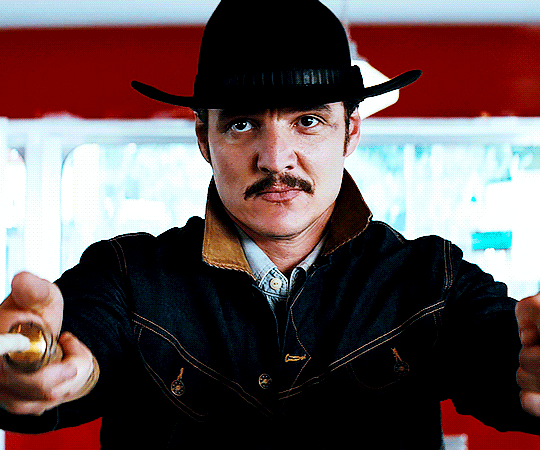
Chapter 1: First Day
Summary: You just landed the job of your dreams, working IT at the revered Statesman organization. Even better, Agent Whiskey asks for your help inputting case files for your special project.
Warnings: daddy kink, age gap, power dynamics, power imbalance, lots of smut, unprotected sex, oral (both receiving), PinV.
Word Count: 3698
You take a deep breath, and look up at the large, reflective building towering above you. You can’t believe you’re here, moving across the country to New York for a new job at a prestigious espionage organization. A part of you doubted if you even deserved to be here, but your qualifications spoke for themselves. This felt like a dream come true. You rang the brass bezeled door bell and the doors immediately open.
“Come on in, take the elevator to the top floor and meet us in the conference room straight ahead,” a familiar, feminine voice projects over the intercom.
You take the elevator to the top floor, and as the doors open you make your way directly to the conference room. You open the doors, and see Ginger Ale, the woman you had your first interview with, gives you a smile and pats the seat next to hers. A man with a cowboy hat, suit and glasses sits at the head of the table, along with hologram projections of other men dressed in a similar fashion. You make your way over to Ginger and take a seat.
“It’s so nice to meet every one of you, and I just want to say it’s been an honor being selected to join your team,” you state, attempting to hide your nervousness.
“I hope to aid making Statesman the most effective counter-terrorism organization in all the world,” you declare. The man at the head of the table looks at you with warm, soft welcoming eyes and smiles before saying,
“Well sugar, it’s a pleasure to meet you. I’m Agent Whiskey, but you can call me Jack. Why don’t you go on with tellin’ us your plans to optimize Statesman?” You feel your breath leave your body after briefly admiring his warm brown eyes,
“Actually, my code name is Grenadine but you can call me (y/n),” you say with a smile. You always hated older men addressing you by anything other than your name, especially in front of your constituents. Being a woman in tech, you learned how to navigate these situations tactfully. After a brief pause you open you stand up and all eyes are on you. You notice Agent Whiskey quickly look you up and down before readjusting his eyes toward your face. You clear your throat to speak.
“I plan, with the help of all of you, to review case files dating back as far as possible. I developed an algorithm to review areas of success and opportunity. This will aid Ginger Ale in creating tools to succeed in further missions. I need to review everyone’s case files. They’ll be imported into a new data base and analyzed. Patterns and trends will be created. Ginger and I will be able to review these trends and create more advanced tools to aid agents in the field.” You sit back down and place your hands on top of one another, and lean back a smidge. Ginger gives you a brief smile before asking,
“Does anyone have any questions about Grenadine’s project?”
Jack, lifting his fist away from his chin, turns his chair to you and Ginger.
“And just how secure is this data base darlin?” Again with the pet names, but there’s something about him that makes it permissible. Maybe it’s his sweet southern drawl. Perhaps its his strong, large hands and broad nose. Whatever it is, you cannot deny that Agent Whiskey has an intoxicating effect. He’s smooth, sweet and warm, just like his code name. You resist the urge to consume any more of his charm, attempting to stay sober in front of your peers.
“It’s all stored locally on servers in a secure location. I’ve coded several firewalls that will alert those on a need to know basis if there’s any detection of infiltration. At that point, the entire system will be wiped,” you respond. The holographic Statesmen around the table appear impressed, but Jack doesn’t change his stern facial expression.
“That’s a mighty fine kill switch you got there Miss Grenadine, but ain’t it gonna defeat the purpose if all this information is lost?” Jack asks, without breaking eye contact.
“It won’t be lost, we aren’t destroying the original documents. Those will live in secure locations. I doubt anyone would be willing to physically break into a Statesman’s office to rifle through file boxes like it’s the 70s. And even if they do,” you say, warmly smiling at him, “they’d be caught between in-between a Statesman’s lasso.” The men around the table chuckle, and Jack gives you a slight smile and nod of approval. Champ, the man who gave your final interview and congratulated you on joining Statesman, speaks up. “Now we got a lot of old timers, myself and Whiskey included, who wrote down files on pen and paper. Is that gonna be a problem Grenadine?” You prepped yourself for this question, knowing Statesman had been active since the early 1900s.
“Not at all Champ! You see, I’ve developed a secure application accessible only on Statesman hardware that can translate handwriting to text and import it on the secure algorithm. Even if it can’t, I can review any files and manually input any missing information,” you state with sheer confidence. Champ looks at you and grins,
“Well, good luck translating Whiskey’s hand writing,” Champ quips, and the rest of the room bellows with laughter.
A few more Statesmen ask you questions. You gladly answer without missing a beat. Eventually, the meeting adjourns and the holograms sign off. You stand up from your seat and make your way to the door with Ginger. Agent Whiskey speaks,
“Miss Grenadine, would you mind hangin back for a spell. I just got some more questions.” Ginger looks at you, grabs your wrist and whispers in your ear, “Be careful with that one (y/n).” You gulp, take a deep breath and walk toward him.
“Now sugar, Champ ain’t kiddin’ when he said my writing was God awful,” Jack says with a chuckle. You slightly giggle, and sit down next to him, ignoring the knot growing in your lower abdomen.
“It’s okay Agent Whiskey I-” you say before he cuts you off.
“Sweetheart, I already said you can call me Jack,” he says, leaning closer to you. You feel heat rush to your face,
“Sorry Jack. Like I said in our briefing, I don’t mind transcribing older files manually. Just give me the files and I can take care of it at my desk.”
“Miss Grenadine, I don’t want to burden you with my chicken scratch notes. Would’t it be faster…easier if you came by my office and we reviewed them together?” Ginger’s words of caution rung in your ear, but your heart pounded at the mere idea of being alone with the most attractive Statesman. Was he flirting with you? Or was this just his demeanor? Maybe he was trying to help a newcomer make a name for themselves in this organization? After all, he is technically your boss and what kind of boss wouldn’t want his subordinate to succeed? You take a deep breath.
“That sounds like a fantastic idea Jack. I’d love to get your help and your input on previous missions would greatly benefit my knowledge of Statesman,” you say attempting to sound professional.
“Alright, alright Miss. Meet me in my office around, say, six o clock?” He lets out a deep breath, stands up, and you do as well. You extend your right arm out to shake his, and he firmly, yet gently grasps yours. His large, warm hand engulfs yours and you can’t help but feel a surge of excitement rush throughout you. Breaking away, you leave the conference room and head to the roof top to get some fresh air.
From the rooftop, you can see New York City in all its glory. This feels like a dream come true. Your first day appeared to be a success, you gained respect from the Statesman, and now your handsome boss wants to make sure you get this project up and running. You call your best friend from back home to share the news. After the initial pleasantries, you say to her,
“Oh and get this! Head of the New York office wants me to work with him personally to get to input his information into the new data base I created.”“That’s amazing (y/n)! It seems like you made a really great impression. I always knew you’d do great things. I can’t believe you're working for one of the best distilleries in the US,” she says. Smiling, and looking down at your shoes you mention,
“It also doesn’t hurt that he’s one of the hottest guys in the office.”“Really? Well don’t get a reputation on your first day,” she jokes.
“What’s he look like?” She asks.
“I think he’s from Texas? He’s got a whole cowboy thing going. He’s got brown hair, brown eyes. He’s older too. Totally got a daddy vibe,” you say, feeling that heat rise up to your face again.
“Daddy? Like he’s got kids?”
“No, I mean… well I don’t know. Look I’ll explain it to you later. Gotta go!” You end the call. Little did you know, Jack was behind one of the structures listening in on your conversation. A smile grows wide on his face.
The rest of the day is spent touring the facilities with Ginger, getting to know the equipment and familiarizing yourself with different programs. As exciting as this is, you’re looking forward to tonight more. You try to push back this growing crush to the back of your mind, and focus on absorbing all the interfaces and layouts Statesman has to offer. After all, you’re here to work. Luckily, the day goes by quick and before you know it almost everyone is leaving the office… Everyone except you and Jack.
“Hey Grenadine, wanna share a taxi back home?” Ginger asks. “Oh I’m staying a little later to work on the algorithm project,” you say. Ginger glances away from you, observing Jack’s office with the lights still on. “Ok, just remember what I said earlier and Grenadine?” “Yes Ginger?”
“Don’t work too hard, it's only your first day.”“Good thing I’m on salary,” you joke. She laughs, and bids you a good night.
After seeing the elevator close behind her, you make your way to Jack’s office and knock on the door.
“Well hello gorgeous,” he declares and motions you into his spacious office, furnished with a warm rosewood desk, luxurious rugs and two cozy looking leather seats. You tell yourself he’s just a gentleman, and respond,
“Hello Agent Whiskey, thanks for taking the time to help me with this,” you say trying to sound as professional as possible.
You take a seat across from his on the other side of his desk. He hands you a stack of old, dusty files and Champ wasn’t kidding. This handwriting was a challenge to decipher. You begin shuffling through the papers, and start scanning the documents into your Statesman tablet.
“Hey Whiskey. I got most of this mission inputted, but I’m having trouble making out the location. Could you take a look?” You pass the paper to his side of the desk, and his hand grazes yours and you instinctually jerk back a tad. He looks up at you and grins,
“Now sweet pea I don’t bite,” he says with a chuckle. “You ain’t gotta be scared of old Jack.” The heat rises to your cheeks and you look down at your now empty hands.
“I didn’t mean to come off like that Jack, I’m just nervous since its my first day and all. I guess there’s a reason you’re out in the field and I’m in the office,” you look up at him with your big, beautiful doe eyes. You can see his pupils widen, and he reaches for your hands and begins to stroke them. A surge of excitement rushes through your body as you notice his large hands engulf yours.
This is a mistake, I should go. I should have known this would happen. I should have listened to Ginger. You think to yourself. You’re drunk on Whiskey. You understand the ramifications of sleeping with your boss, but the tingling in your lower parts is too much to handle.
“I like your hands Jack,” you finally say, with your thumb stroking the back of his hand.
“(Y/n), there’s a lot of parts I like about you. Permission to speak freely?” He asks, with his strong, brown eyes piercing yours.
“Yes…Jack.” You feel your face get hot, and you let out a deep breathe.
“I ain’t been able to get you out of my mind since I met you in the conference room,” he confesses in his southern drawl.
“Jack, you’re my boss. I’ve always dreamed of working for such a rivered organization like Statesmen and I don’t want to throw this all away based on a lapse in judgement.”“It don’t have to be that way darlin’,” he says. Jack pulls your hand toward him and plants a kiss on it while looking you deep into your eyes. He moves his lips away from the back of your hand, looks up at you and says,
“Besides, don’t think I didn’t hear what you called me on the phone earlier,” he smirks. Your stomach tingles into your vulva. You let out a deep breathe, and begin to squeeze your legs together.
“Aww sweetheart, look what I’m doin’ to you,” he teases.
“I can’t,” you whine. “It’s not right,” you say with your eyes watering out of frustration.
“Honeybee, don’t get upset. Why don’t you sit on daddy’s lap so you can see what you’re doin’ to him?” Any self control you attempted to muster is completely gone. You know you should leave, in order to preserve your reputation, but you can’t. You get up and make your way to Jack, he grabs your wrist and pulls you down onto his lap. His growing member pushes through his jeans and onto your ass. He grabs the sides of your face and pulls you in for a kiss. His mustache tickles your lips as his tongue dances with yours. You begin to move your hips back and forth, desperate to feel him.
“Now that wasn’t so hard, now was it?” He teases you again. His hands make their way down your frame. You move your legs from the side of the chair and straddle his hips.
“Oh Jack you feel so good,” you let out as your skirt opens and the fabric of your panties grind against the denim outline of his cock.
“Yeah baby girl? You like feelin’ my cock rub against sweet little pussy of yours?” He asks you, taking your top off and throwing it across the room. You let out a breathy “Yes.” He starts massaging your breasts then unclasps your bra, exposing your hard nipples. Cupping your right breast with his hand, he puts his mouth to your nipple and gently moves his tongue in a swirling motion. You grab the shoulders of his blazer and slide it off his rugged body, clasping his forearms as you do so. Then, you grab the bottom of his shirt and begin pulling it off of him, knocking his cowboy hat off. You wrap your arms around him and his mouth meets yours. You can feel his warmth as you two make out. You grab his biceps and rub your hands down them as you kiss each other. You slide down from his lap and onto your knees, looking into those dark, beautiful eyes. Your eyes move down to his silver belt buckle with the engraved Statesman logo.
“Daddy… Can I?” You ask sweetly.
“Baby girl I’d be a god damn fool if I said no,” he responds. Eagerly, you begin to unclasp his belt, and pull down his jeans with his boxers attached. You are amazed watching his cock spring out, hits his belly before staring right at your face. You start to lick the base, moving your tongue up to the tip swirling your tongue around it.
“Darlin’ don’t tease me like that. Show me what a good girl you can be,” he sighs. You put one arm on his thigh, the other at his base and begin taking his length in your mouth. His size is impressive, and grows more as you inch your mouth around it. You relax your jaw, and breathe through your nose as it travels deeper and deeper down your throat. He pushes the back of your head down until your mouth reaches the base of his cock. You look up at him, eyes watering, as his pupils almost engulf his iris. The hand on the back of your head begins bobbing you back and forth as Jack fucks your mouth. You arch you back.
“Now that’s a good girl,” he remarks. He moans with each thrust as your fingers dig into his thigh.
“God damn sugar that mouth is made for me,” he says as he pulls you away from his cock. He bends down, picks you up and places you on his desk facing him. He pulls you in for another kiss and you groan with excitement. He pulls your panties and skirt down to the floor.
“Daddy’s gonna make you feel real nice honey,” he says locking eyes. He grabs both of your knee caps and pushes them away from each other, exposing your sex. He pushes his index finger in you and you whimper, he pulls it out and then pushes two fingers in, twisting around causing you to squirm.
“Oh Jack I want you so badly,” you let out.
“(Y/N) you got me,” he says beginning to pump his fingers more rapidly. His lips make his way down your heat, and begins licking you while his fingers fuck you. You let out several groans. His free hand spreads your folds and his tongue circles around your bud. The fingers that are inside you begin to curl upward and hit your special spot.
“Oh fuck Daddy, keep doing that,” you pant, looking up at him worshipping your body. Encouraged, he picks up his pace and you begin to shake while letting out breathy “yeah”s over and over. The pressure builds up and you let out a long moan, throwing your head back onto the desk. Your body is shaking and your breathing shallow. Jack towers above you and grins,
“Babygirl you taste sweeter than molasses.” He leans down and kisses your lips while positioning himself at your entrance.
“You ready to take Daddy’s cock?” You look down and adjust yourself closer to him. Your back arches, perking up your breasts. He stands back up, and strokes your thighs.
“Jack please go slow,” you tell him, hinting it’s been a while.
“The last thing I wanna do is hurt my little girl,” he says.
“(Y/N), tell me if you want me to stop. You hear me?” He asks, gazing into your eyes and brushing his hand against your cheek.
“I promise,” you respond.
“‘I promise’ what?” He asks sternly.
“I promise Daddy.” You grab his hand, and lace your fingers with his. His tip enters you and you can already feel his width stretch you. He exits you, then enters you again deeper, this time halfway. You feel your walls sweating and your hips buck forward to meet his cock. With this encouragement, he enters you half way. You let out an audible gasp, followed by a moan.
“Keep going Jack, I can take it,” you say looking up at him.
“Thatta girl,” he smiles. He thrusts deeper into you, entering you fully. He lets out a “fuck” under his breath which you follow with a moan. His rhythm is slow and steady and you can feel him stretch you. You lock eyes with him, grab his free hand and put his fingers in your mouth. You begin to suck them, he lets out a groan and begins to fuck you faster. He pulls his fingers out of your mouth and grabs your hips. You moan while putting your hands over his.
“You like that baby girl? You like being full of daddy’s cock?”
“Yes Daddy Whiskey,” you coo. He smiles, releases his hands from you and orders, “Open that pretty little mouth.” He sticks his finger down your throat, pulls it out covered in your saliva and beings vigorously rubbing your clit. Your thighs shake and you start panting heavily.
“Daddy please,” you let out and he fucks harder. He grabs your throat with his free hand and your thighs wrap around his waist. You whimper as he pounds into you, his finger pressing harder on your bud.
“Cum on daddy’s cock sweet thing,” he commands. You shake and let out a muffled moan. He pulls out of you and sits on the leather chair behind you. He pats his lap,
“Go on, show daddy what you got,” he commands. You stand up from the desk, legs shaking like a new born foal. You position yourself above him, he grabs your face and kisses you passionately. You break away and take a deep breathe.
“Save a horse, ride a statesman,” you giggle. He smiles with a chuckle,
“Baby girl you’re perfect,” he says. Your hips move down, and you begin to motion your hips back and forth, riding his cock as if your life depended on it. You feel his balls slap against the area between your sexes. You let out a few squeaks and moans, your tits bouncing in his face as he kisses them. He starts breathing heavier,
“Daddy’s gonna come,” he exhales. He starts to push you off, but you saddle back on his hips. His eyes widen, he lets out a deep groan and shoots his load into you. You can feel his seed shoot into you and you let out a gasp. You get off of him, kissing him softly.
“I’m gonna have to keep you around baby girl,” Jack says as he embraces you.
#agent whiskey x female reader#daddy!whiskey#pedro pascal#agent whiskey x reader#agent whiskey x you#agent whiskey x y/n#agent whiskey fic
371 notes
·
View notes
Note
Please innumerate for us the specialized problems of the library sciences.
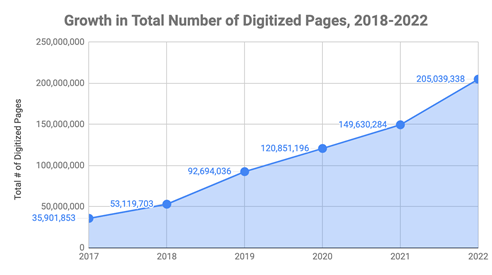
Let me start with the caveat that my information is based on my experiences at the National Archives more than a decade ago, and policy has definitely changed on this front as we can see from this graph of recent digitization - apparently NARA wants to get to 85% digitization by 2026. (Even still, I'd note that the records of the WPA are <0.001% digitized.)
However, back when I was doing the research that would eventually become my first book, I remember being at the National Archives II building in College Park, Maryland (Go Terps!) and getting really frustrated that all the records of the WPA were only available in their original physical form and that all the guides and indexes were also in paper only and were all from the 1970s, and I asked the archivist why the hell the National Archives hadn't been digitized already.
This is what they told me: if it's handled correctly and stored in the right environmental circumstances, paper can last a thousand years. Carbon copies can last even longer, if they don't rip. (Seriously, the bastard things are like onion skins, they'll split if you look at them funny.) Microfilm is slightly more technologically advanced than paper, but it only lasts 500 years in the right conditions.
We've only had computers en masse since the 1980s, and already there's a huge amount of records (especially from the early years) that we don't have any more, because the hard drives got re-formatted due to higher costs of storage space back in the day, or because old computers got thrown out when they were replaced by newer models and the hard drives are all rotting in landfills somewhere, or because backwards compatibility broke down and we just can't read those file types on our modern computers, or because the actual data got corrupted on the disc, or because some legacy company is asserting copyright against a video game museum, or because some political hack and/or president of the United States decided to violate the Presidential Records Act.
While we thought that the internet would cause an explosion of written records from ordinary people on the scale of the advent of mass literacy, there are vast swathes of the early internet that simply do not exist any more because the servers got switched off when Geocities et al. folded in the dot-com bubble burst or when everyone migrated to Web 2.0, and the Internet Archive tries its best (bless its heart, affectionately) but it can't be everywhere and save everything.
As a result, the archivist told me, digitization is a fraught question: what file format do we use? How do we know that file format will still be compatible and backwards-compatible in 50 years? 100? Longer? Do we keep everything locally or store it on the cloud, and how do we ensure that the storage mechanisms won't fail if there's a blackout or a virus or whatever? Do we digitize everything now, or do we wait until optical character recognition improves enough to the point where digitized records can be searched for words and phrases? Etc.
Keep in mind, I am a public policy historian who studies the 20th century U.S - I work primarily with the official records and the central archives of the richest government in the world. From a library sciences perspectives, this is kind of an ideal scenario, and it's still kind of fucked up. (Let me tell you, the rage and grief I felt when I learned that most of the General File of the Public Works Administration was thrown away by the National fucking Archives and Records Administration in the mid-1950s because they were running out of shelf space in the D.C location and didn't think these records were important...)

Now imagine what it's like at a local historical society or a small liberal arts college, or the national museum of a developing nation for that matter, who do not have the resources for the kind of grand digitization project that NARA started doing five years ago. Think of the sheer scale of historical records that sleep, unseen and untouched perhaps for decades and perhaps for ever, in little cubbyholes all across the world. Among professionals, historical records are measured in linear and cubic feet - think about that for a second, how many pages of paper there are in a foot when you stack them up, and how many hundreds and thousands and millions of feet there are across the face of the world. Think of all the millions of feet of pieces of paper that have been lost to us because of fire or rot or war or time itself.
This is why Peter Turchin is a quack. Historical records are not a standardized little database for social scientists to plug their fucking spreadsheets into; historians don't play that kind of bullshit t-ball, with all our data neatly packaged and handed to us on a silver platter. Our profession is not a social science, it's a goddamn treasure hunt through boxes that were never catalogued or categorized (or that were re-catalogued so many times no one remembers how they were put together in the first place) to find writing that no one has read since the authors died. All of us know that our work, our understanding, will always be partial and limited, because memory is infinitely fragile and the very idea of historical preservation is a mad existential defiance of entropy itself. These records are real, they are fragile - to hell with the Library of Alexandria, remember the National Museum of Brazil? - and they are all that is left to us of the dead.
108 notes
·
View notes